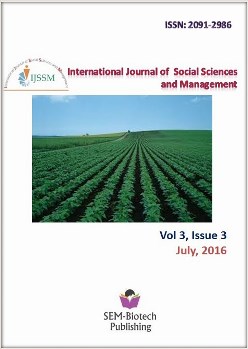Effectiveness of Social Safety Net Programs for Poor People in the Government Level of Bangladesh
DOI:
https://doi.org/10.3126/ijssm.v3i3.14953Keywords:
Effectiveness, Social Safety Net Programs, Government Level, Poor PeopleAbstract
Social Safety Nets (SSNs) and the wider topic of Social Protection have assumed a centrality within the development literature in recent years. Publicly-sponsored protection of the poor and vulnerable has emerged from the shadows to become a mainstream concern for policymakers. The contribution of SSNs is now viewed not merely in terms of their impact on challenged families, but their systemic benefits - in enabling higher levels of employment and entrepreneurship, sustaining household consumption and human capital, securing pro-poor growth and promoting social inclusion and national cohesion. A body of experience, ranging across continents, has now been established to inform the building of functional social protection systems. Yet in spite of this new consensus much controversy remains. A crucial first step in the development of a well-fitted national approach is the balancing of experience elsewhere with the national context. The ambit of SSNs in Bangladesh is often wide and fragmented. These typically include welfare payments, work guarantee schemes and conditional cash transfers; and comprise both on and off-budget allocations and a plethora of programs supported by donors. Gaining an understanding of the nature of provision and its functionality is another important first step in crafting a pro-development social protection system. This research provides information about different social safety net programs in government level. An attempt has been made to explore the effectiveness and the existing problems of current social safety net programs. The study also discusses the status and accessibility of beneficiaries in selected areas as well as advantages, limitations and prospects for social security in the context of this country. Besides, it also assesses the opinions of non-beneficiaries who know more or less about the programs. Finally the paper suggests that there is a need to establish workable and sustainable effects among recipients. It also recommends that systematic efforts should be made urgently for the proper organization and management of safety net programs.
Int. J. Soc. Sc. Manage. Vol. 3, Issue-3: 153-158
Downloads
2115
1444




